Imperial welcomes brightest new PhD researchers
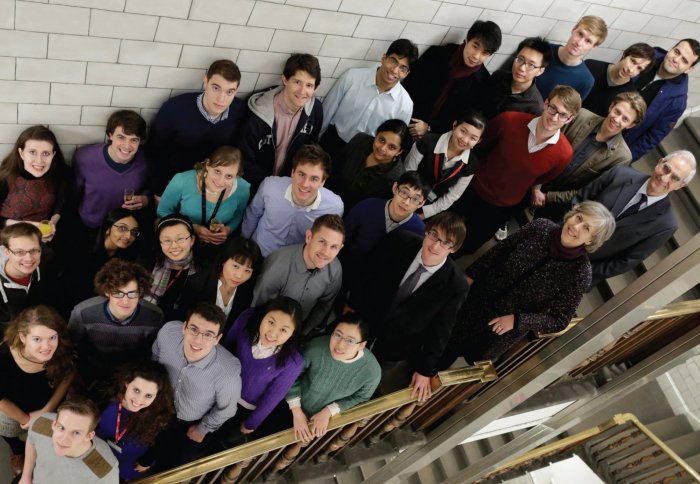
50 of the world's best and brightest new doctoral researchers have become the first recipients of the Imperial College PhD Scholarship scheme.
The new scholars gathered at a celebratory reception on Tuesday evening hosted by President & Rector Sir Keith O’Nions. The prestigious scholarships were first announced in November 2012, and are intended to encourage some of the finest minds from across the globe to pursue their studies at Imperial.
As the students networked over drinks, they were given a warm welcome by the President & Rector. Sir Keith said, “I believe that something like 22 nationalities are represented here, which shows how truly global our community of PhD scholars are. We’re delighted to have been able to award 50 of these scholarships and this has been largely dependent on the generosity of our alumni and friends of Imperial."
The group also heard inspirational words from the former head of MI5 and Chair of Imperial’s Court and Council, Baroness (Eliza) Manningham-Buller. She explained her unexpected path to leadership and encouraged the students to instead start thinking about their leadership style now. "Don't do what I did - I'm encouraging you to think about leadership early on in your careers
After urging the students to play to their strengths and to surround themselves with individuals who could give them honest feedback and advice, Baroness Manningham-Buller also suggested that humour was important. Drawing parallels between the gravitas of the student's work and her work for the Security Service, she said, “Precisely because you’re dealing with serious things, if you don't remove some tension through humour then it stops being fun to come to work."
A hot topic throughout the evening, which was arranged by the Graduate School, was the nature of the students’ research. Below, some of the students describe what they’ll be working on and what the funding means to them.
Jack Hare (Physics)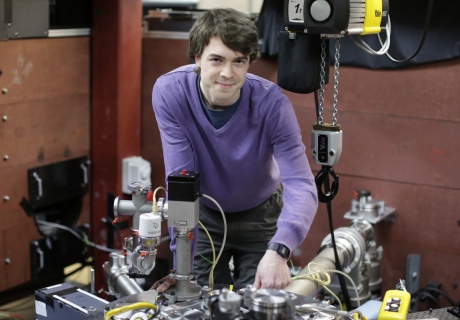
Jack completed undergraduate and Masters degrees at Cambridge University, and left a graduate programme at Princeton University to come to Imperial.
"I'm studying plasmas, which are very hot ionised gases. We use a machine in the basement of Imperial that's about the size of a house. It's called the Mega Ampere Generator for Plasma Implosion Experiments, or MAGPIE for short, and turns things that we think of as solids, like aluminium, into liquids or even plasmas. Those [liquid or plasma] states normally only occur in stars and the centres of planets, so we’re creating things which are truly unique.
"I'm particularly interested in nuclear fusion; the fusing of light elements together into heavy elements to produce energy, which you can then use to generate electricity. We can’t crack the nuclear fusion problem here, but we can certainly have a good look at certain parts of it. That is really exciting and it will inform the work of larger labs and facilities around the world which are trying to crack the problem of sustainable nuclear fusion.
“The funding definitely helped. I was in a graduate programme at Princeton so the easiest thing would have been to continue there. Without the scholarship I probably wouldn’t have come to Imperial."
Mariia Koziakova, Surgery and Cancer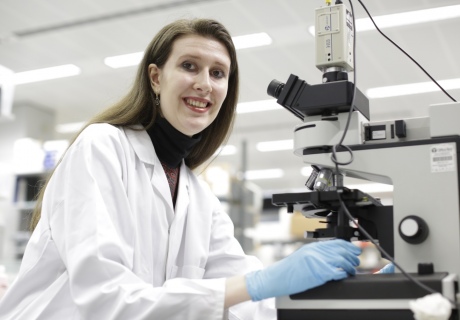
Mariia completed her Biology undergraduate degree in Kiev, Ukraine, specialising in human and animal physiology. She completed her MRes in Biomedical Research at Imperial.
"My research group is focussing on traumatic brain injury, and my project will be on blast brain injury and the development of noble gas treatments. It's currently a very important issue worldwide, not just in wars, but also in terrorist attacks and in improvised explosive devices.
"We are trying to develop a treatment based on the use of noble gases such as xenon and argon, which have been shown in models to be quite effective. It's more biomedical research than medicine – more scientific than clinical – and hopefully it will make a real impact in the future.
"The funding was extremely important. The cost of studying in London can be quite high, but I really wanted to study here because I love the College and it's given me so many opportunities."
Rowan Brackston, Aeronautics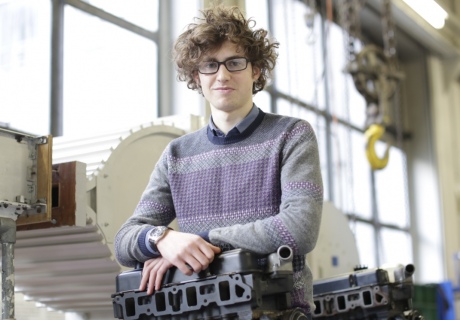
Rowan came to Imperial from Cambridge University, where he completed undergraduate and Master's degrees in aeronautics.
"My research is into flow control. The overall aim of it is to reduce drag for automotive vehicles, but the sort of methods that we use and develop will be applicable to a much wider range of flows.
"The main characteristics of a car or a lorry are that it has what’s known as a bluff body - it's not streamlined in shape - so the flow separates over the back face of it and there's a large wake. Wakes like that are present in all sorts of bluff body flows, say in bridges or towers, and they cause problems. They are characterised by a large pressure drag force and also by phenomenon like vortex shedding, which is where you get a large unsteadiness in the wake.
"My research is to try and influence the flow and to try and reduce the drag, and to potentially reduce vortex shedding or unsteadiness. The idea is to use quite a mature field - feedback control theory - on a new field, in order to reduce drag. This research is fairly unique, I certainly don’t know of anywhere else in the UK that's doing flow control research along these lines.
"I'm very appreciative of the funding. I think it’s great to encourage people who have done degrees in engineering or physics or science to actually stick with it, and try and do something useful."
Oliver Graham, Surgery and Cancer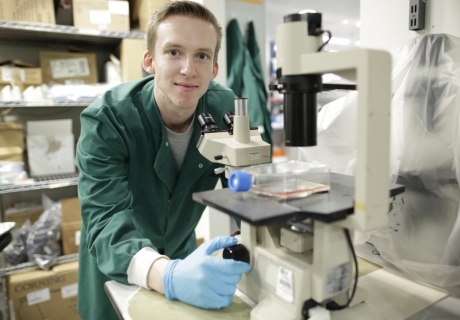
Oliver completed his undergraduate degree in Human Sciences at UCL and a Masters in Biomedical Research at Imperial.
"I'm looking at dietary carcinogens, or cancer causing chemicals, and the effect that inflammation has on them. I'm particularly looking at inflammation in prostrate cancer, which is the most commonly diagnosed cancer in men worldwide and the second biggest killer of men in terms of cancer.
"I'm going to be looking at two types of dietary carcinogens. One is caused by incomplete combustion of organic materials. It's called benzopyrene and if you ever have black bits on toast, or well-done bits on meat, then that's it. The other one is called fip and it's caused by the breakdown of proteins by heat. It's also very common in meat. We're consuming these things on a daily basis, so any further understanding of things as common as inflammation and dietary carcinogens in the development of cancer is really important.
"Most cancer research goes, 'OK, you've got cancer, what can we do?';, whereas I'm looking at the development of cancer. I think my research can really drive forward the understanding of those processes, and hopefully stop prostate cancer from being such a prevalent killer.
"The funding has been very important. It's great that I have an opportunity to contribute to scientific research here at Imperial, and to cancer research as a whole."
Marketa Kubankova, Chemistry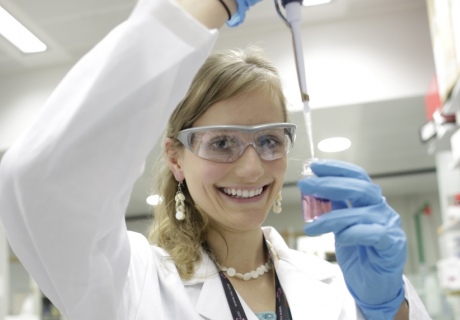
Marketa completed her undergraduate and Master’s degree at Czech Technical University in biomedical engineering fields.
"My research group are using a group of molecules called molecular rotors. They are fluorescent, and we use the fluorescence of them to report on what is happening in their surroundings. We can use this for many different applications, but what I’m trying to do is use these molecules to study the proteins and protein folding aggregations.
"The aggregation process happens during diseases like Alzheimer’s, Parkinson’s and Type 2 diabetes. No one understands what’s going on during the onset of these processes, but if we understood it then it could lead to better treatment and prevention of these diseases.
"On a normal day I do experiments in the lab and then I go on to analyse the data. That’s the hardest step because you have to try to figure out what's going on. It’s the longest step but it’s the most fun because it’s exciting to find out new things.
"The funding made a pretty big impact - if I didn't get this I would have been unsure where to go. London is an expensive city so I'm glad I can focus on my research and not spend all the time finding the cheapest ways to live."
Article text (excluding photos or graphics) © Imperial College London.
Photos and graphics subject to third party copyright used with permission or © Imperial College London.
Reporter
Jessica Adams
Advancement